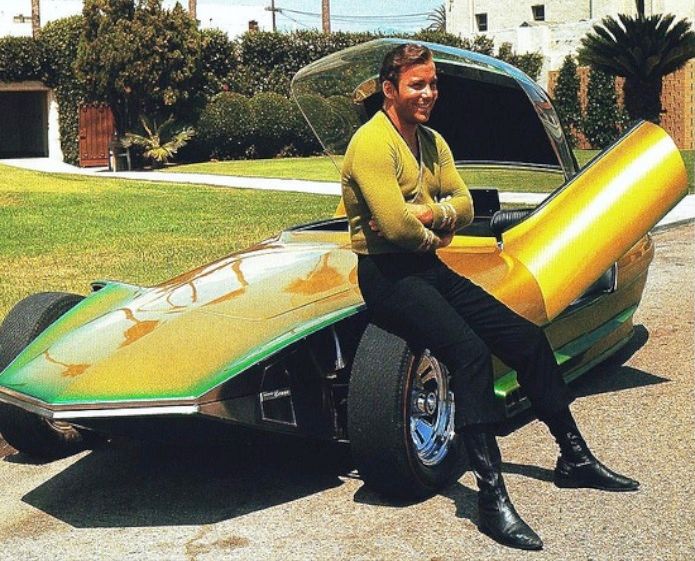This episode contains what is probably the single (imho) most reprehensible thing Kirk ever does, he was offered the "use" of a female slave for the night and (apparently) does have sex with her.
I sometimes watch Star Trek that has been translated into Spanish, the son/sun thing obviously doesn't have the same ability to be confused (hijo/sol) in Spanish and is one of the clear indications that what the Enterprise's crew is speaking in the future is English.
I liked the episode's last scene, it showed that religion was alive and well among (at least some) of our heroes, I especially liked the joy on Uhura's face and in her voice as she made her explanation.

"Bread and Circuses" ranks as my all-time favorite TOS, and my all-time favorite of the entire franchise. And yet, the scene where Kirk is greeted by Drusilla with "I was told to wait for you" was among the cheesiest in TOS.
Note that Drusilla plainly orders Kirk: "Command me". It's clear that the Proconsul approached Drusilla in advance, told her what Kirk was, and asked her if she would be interested in wining and dining a real-live space alien... and possibly more. Note also that Kirk does not try to escape, even after she assures him "We're alone. Please believe me." He knows that if she screams, the goons will come a-running. They're just not outside the door. It is plainly understood that Claudius arranged this private "close encounter", no doubt with Drusilla's enthusiastic consent. This is later confirmed when the Proconsul has Kirk frisked in a search for a missing Enterprise hand-talkie and Marcus clearly quips to Kirk: "Not that I would have punished her. I would have blamed you. You're a Roman, Kirk, or you should have been." With that, the Proconsul made it clear that "my pretty Dursilla" is his personal slave/geisha, and, as has been the long-standing tradition among many Asian good ol' boys, he is happy to share. We can sit back and judge Kirk to be a lascivious boor for indulging Drusilla, as we can sit back and judge societies that still quietly condone geisha-like activities to this day. We can also judge the society of Planet IV in System 8-9-2 as being intrinsically evil for practicing open slavery in a "20th century" industrial society.
But there is a little fly in the ointment here. If we start judging issues like that, we wind up questioning the merits of the Prime Directive, which allows Kirk off the hook for not ordering the overthrow of the Empire and it's enslaving, flesh-trading ways. After all, 100 Enterprise crewmen, armed with phase pistols, could overthrow the entire Empire. If Kirk were a truly moral fellow, he'd surely order that, wouldn't he?
But he doesn't order an attack on this hands-off planet because it's his duty to obey the Prime Directive. Instead, he does the Starfleet thing, proceeding to investigate what happened to the "merchant service" vessel S.S. Beagle, beams down personally to find out what happened to Captain Merrick, and comes within a hair of getting himself killed.
It's already understood in TOS thus far that the Prime Directive keeps both "strange new worlds" and the Federation out of trouble. Consider it a "you break it, you buy it" philosophy. Was it reprehensible for Kirk to temporarily fall for Nona the Kahn-Ut-Tu witch (Mrs. Tyree) or Shahna the Drill-Thrall or for Captain Pike to fall for Vina, illusion or no illusion? One could argue that fine and upstanding starship captains, with the high-minded principles and their disciplines, would be expected to keep their trousers on. Since they didn't, was this destined to be yet another failure of "1960's TV" as personified on TOS?
Not so fast...
On planet "Angel One", Riker doesn't hesitate to bed-down with Mistress Beatta in the name of inter-world diplomacy. Only that wasn't TOS, it was TNG... and just about 20 years and some months later... But wasn't that reprehensible as well?
Perhaps the notion of Starfleet allowing strange, new peccadillos can be explained by a "it's none of our business" clause. Just as today, the notion of politics and corporate culture prying into private sex lives/orientations is slowly being challenged, perhaps it can be said that Starfleet can make no law forbidding intimacy with the natives while visiting on a mission.
To be sure, the notion of slavery, prostitution and other forms of using people makes me queasy as well. And the little "Kirk romance" music in that "I was told to wait for you" scene was cringe-worthy. But let's remember the context of the scene. Kirk is trapped, and his "Condition Green" stunt just signed his own death warrant; he expects to be tortured or otherwise killed for it soon. Given that Kirk is clearly known as a Fonzie kind of guy to begin with, is it really out-of-character for him (and is it really that bad) for our hero to make that "last request", particularly with the obviously enthusiastic Drusilla?




